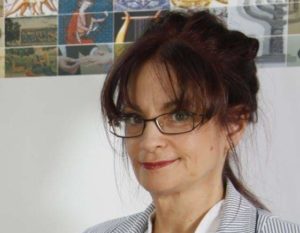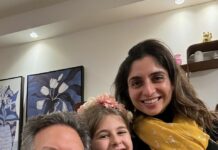Jewish community events and organizations are often steeped in religion. And while a shared religious identity is what ties the Jewish people together, it can also be meaningful to acknowledge Jewish culture and history in a context separate from religion.
This is the principle that the Baltimore Jewish Cultural Chavurah was founded on, and why it is holding a Zoom event featuring Rabbi Sivan Malkin Maas, who is a figure at the forefront of the Secular Humanistic Jewish Movement in Israel. The online program will be on Sunday, June 12, at 10:30 a.m.

“For most of my life, I wasn’t in a Jewish organization because I felt most of them were religious organizations,” said Fred Pincus, a member of the chavurah’s planning committee. Raised in a family that was not religious but still “self-consciously Jewish,” he found himself gravitating toward Baltimore Jewish Cultural Chavurah because of its focus on the more secular aspects of Judaism.
“Our group is kind of a home for Jewish people who couldn’t find a home in a traditional synagogue, so we emphasize culture and history,” he said.
It was this focus that led the chavurah to seek out Maas’ guidance. Her father, Yaakov Malkin, was selected as the 2021-2022 Humanistic Jewish Role Model of the Year by the Society for Humanistic Judaism. Baltimore Jewish Cultural Chavurah held a program honoring him in February, which is what connected them to the rabbi.
The chavurah’s board is honored to have someone like Maas speaking to them. She is the founder of Tamura-IISH (International Institute for Secular Humanistic Judaism) in Israel, as well as the first Israeli to be ordained as a rabbi in Humanistic Judaism.
Though Maas is a rabbi, Baltimore Jewish Cultural Chavurah board member Arlene Ogurick says she is not one in the traditional religious sense.
“Rather than as religious leaders, she views rabbis as educators,” she said of Maas.
Though some may see the idea of secular Judaism as an oxymoron, the movement is steeped in the idea that religious authority and the personal lives of Jewish people should be separate. According to the International Institute for Secular Humanistic Judaism, members of the movement may still believe in God, but the focus of their work is the influence of people and culture rather than a higher power.
There is also a sense that Secular Humanistic Judaism is a way to return to the roots of the religion. It was largely inspired by the teachings of rational philosophers and the ideas of enlightenment philosophy.
“It has a strong history in Jewish culture,” Ogurick said. “The belief is that Judaism is an evolving civilization of Jewish people and has been created, lived and recreated in response to the beliefs of each generation.”
The Baltimore Jewish Cultural Chavurah also practices Secular Humanistic Judaism. For over 20 years, its members have met twice a month to discuss Jewish culture, history and society.
Some of its members belong to synagogues with a more religious bent, while others do not. There are even families belonging to the chavurah where some members actively practice their religion, but others are more interested in the cultural aspects.
Pincus and Ogurick say they hope the Zoom event with Maas serves as an introduction to the movement to those unfamiliar with it, especially with regards to its impact in Israel. For longtime members of the chavurah, they hope it will foster further appreciation for Secular Humanistic Judaism.
“You don’t want to lose track of your history, of important figures who have shared literature, art and other aspects of culture with the world,” Ogurick said. “That belief has found a home here.”






